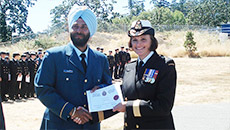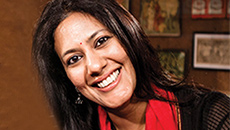If you’re not born with it, can you learn to become a leader?
When you think of great leaders, you think of politicians such as Nelson Mandela and Gandhi, CEO’s such as Warren Buffet and Bill Gates. Then there are all the icons that have impacts on everyday people, Oprah, Michael Jordan, and even Madonna.
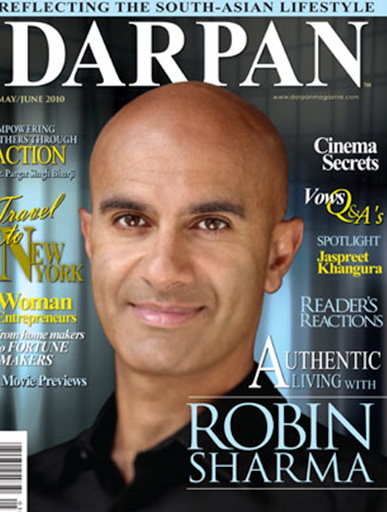
We can sit back and think about how lucky these people are to have such amazing influential positions. We revel in thoughts about what we would do if we had their success. We act as they have won some lucky lottery in life.We rarely stop to examine or consider how these people get to their positions and what sacrifices they may have made. There is no need to sit back and wonder anymore, you too can reach your greatest potential with the help of Robin Sharma.
In one of his latest tweets Sharma says, “Too many people believe that there is something wrong with aiming to be really successful. I have heard it a lot these days, the suggestion that if you strive for success, you must not be all that concerned with making a difference and being signif cant. It is almost as if being a go-getter is incompatible with being compassionate, socially conscious and good.” According to Sharma an extraordinary life contains both.
Now recognized all over the world as a lifestyle Guru and Life Coach, Robin Sharma says “ That anyone can learn to become a leader.” Robin Sharma is the globally celebrated author of ten bestselling books on leadership and personal development. His work has been published in over fifty countries and nearly seventy languages, making him one of the most widely read authors in the world. He shot to fame with his international bestseller ‘The Monk Who Sold His Ferrari’. Robin is the founder of Sharma Leadership International Incorporated, a global training firm that helps people and organizations ‘Lead Without A Title’. He is also the founder of The Robin Sharma Foundation for Children to help underprivileged children become leaders.
Born in Africa, Sharma’s father originates from Jammu and Kashmir, while his mother who is also South Asian grew up in Nairobi. Sharma comes from a strict, yet meager upbringing and he grew up in a town of two thousand people on the East coast of Canada. As a small town kind of guy, Sharma attended Dalhousie Law School in Halifax, Nova Scotia. Sharma a one-time unhappy lawyer started his career from humble beginnings by self publishing his first book, with his mom as his editor. Sharma says that he became a lawyer although he was not passionate about it. He had two law degrees and was working with a very successful law firm, but felt that in many ways he was living someone else’s life. “I was living by an external definition of success rather than by my own.” Sharma appeared very successful although very empty within. He then made a conscious decision to do some soul searching and get his life on a new path.
“Success comes from helping others win. And the ongoing pursuit of excellence is one of life’s best pursuits”.
This began his journey of learning how the best achieved their success, and how superstars created their mastery. Along the way, he learned some very powerful lessons, which he shared in his first book ‘Megaliving: Powerful Wisdom for Self Leadership’ in 1994. Contains two hundred lessons of success and a coaching programme, the book integrates the lessons into daily life. He sold his first book out of the trunk of his car with his dad. Giving up being an attorney and selling a self published book displays how he went to his limits and took an intelligent risk. Sharma says, “Life wants you to win so get out of your own way”, and that is exactly what he did by leaving his law career behind and pursuing his new venture. His book began to sell very quickly and this led to companies seeking out his expertise. Robin’s books have been coveted by top CEO’s, Political Leaders, major league sports superstars as well as Hollywood Celebrities. In an independent ranking of the world’s top leadership experts by leadership gurus.net, Robin is ranked number two. His global training firm includes many fortune 500 companies, including Microsoft, GE, Nike and IBM. World renowned universities such as Yale and Harvard Business School are also amongst his list of elite clientele.
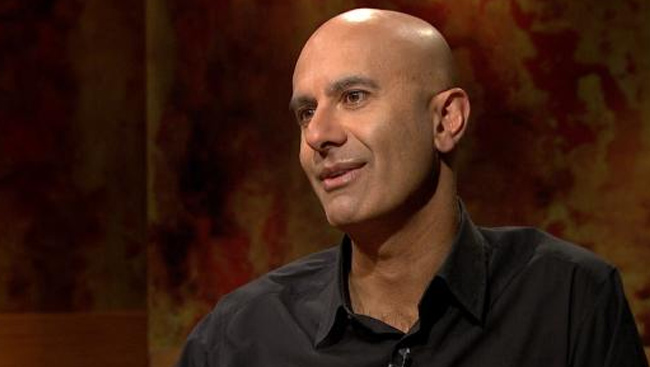
As a reader, writer, and fellow South Asian, I wanted to know what all the buzz was about. Yes this guy, Robin Sharma sounds great on paper, but how was he influencing so many people to lead more productive happier lives? Why were his books being described as truly life changing? I took the plunge and decided to download, ‘ The Monk Who Sold His Ferrari’ onto my Kindle before interviewing Robin. After reading his book, I was instantly hooked by his writing style, which is truly fun, easy reading. I am now onto another book written by him, and I am sure by the time this summer is over I will have read a few more. His stories are captivating and inspiring. His advice feels doable and he leaves you with a sense of motivation that makes you truly want to change your life and the lives of others. The Monk Who Sold His Ferrari is a book about finding out what is truly important in life, none of which has to do with the material possessions that we acquire and give so much weight to. It is about not being defended by our possessions and living by other peoples measures of self worth. In the South Asian culture, like many other cultures it is predetermined what makes someone successful, and often it is at the expense of personal happiness. The more you own usually equates with a higher social status. How many people do you know that have chosen a career based on what their parents think defines success. It has become a stereotypical joke in the South Asian community that you are only successful if you become a Doctor, Lawyer or an Engineer. Even with changing times, and attitudes slowly shifting it is still dominant to be given more respect in the community if you are wealthy versus someone who follows their dream or passion in a lower paying profession.
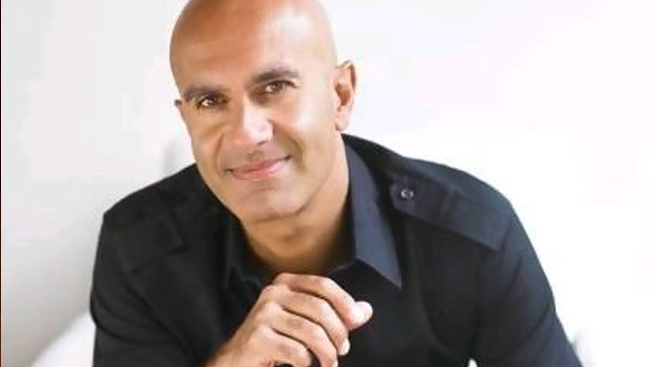
One on One With Robin Sharma
Q: How has being Indian influenced who you are?
A: I have great appreciation for my Indian background. The art, culture and philosophies of my parents have had a profound influence on me-and the way I view the world. And it’s so exciting for me to see India emerge as a business superpower. I’ve been visiting fairly often to help Indian multinationals like The Kumar Birla Group develop employees to Lead Without a Title.
Q: How has success changed you?
A: I hope success hasn’t changed me at all. Far more important than success is passionately pursuing my mission to help people in organizations around the world Lead Without a Title-and show real leadership in all they do. That’s what my new book “The Leader Who Had No Title” is all about. Shifting from behaving like victims at work and in life to becoming leaders of our jobs.
Q: What are a few tips to help people prioritize and “get rid of the clutter?”
A: First, I try to remember that clarity precedes mastery. The more clear you can be on the few things that are important at work and in life, the easier it will be to clear out the useless complexity. Second, I suggest that it’s key to remember that geniuses are brilliant at one thing so avoid trying to be all things to everyone. Also, let’s not define our success by how much we own. Instead, define our excellence by who we are becoming. That’s what the best leaders do.
Q: What inspires you? What makes you happy?
A: A lot of what “The Leader Who Had No Title” is all about is the tactics and tools that superstars in business, sports and science use to get to their best that most of us don’t know about. And working with companies like Nike, Microsoft, FedEx and IBM has shown me first hand how inspirational it is to be around people who will not tolerate any form of mediocrity. So excellent people doing excellent things inspire As well, great artists and inventors inspire me because they have played amid possibility when others saw only problems. Anyone reaching for their best, moves me. Skiing/great conversations/ superb books and travel also make me happy. Helping people express their leadership best and create world-class lives inspires me deeply. And of course my children. With zero doubt, they are my heroes.
Q: What is your definition of success?
A: Running your own race and living life on your own terms versus in a way designed to be liked by the world around you.
Q: If you could change one thing in your journey what would it be?
A: I would not change a thing. Both the good and the challenging were necessary events to bring me to who I am as a human being.
Q: What is your biggest lesson learned to date?
A: Success comes from helping others win. And the ongoing pursuit of excellence is one of life’s best pursuits.
Q: If you could recommend one of your books for our readers to read which one would it be?
A: I’d recommend “The Leader Who Had No Title”. It’s really a book for anyone who wants to learn a powerful system to make some quantum leaps in their success at work and in life. And the time to Lead Without a Title is today. No one knows what tomorrow will bring.
Once swamped with a calendar full of appointments and the habit of postponing things, he has now transformed into someone who applies what he teaches in his workshops to his own life. Sharma says he is now able to make time for his family, massages, exercise as well as work. “A lot of people sacrifice health for wealth and many businesspeople may have millions of dollars, but their health and family are taken for granted.” Robin Sharma teaches people to prioritize and become world class at what they do. He helps people achieve their goals. People have been quoted saying, Robin Sharma has completely changed their way of thinking and made things clearer for them. Sharma says, “This is the kind of reaction that makes his job worthwhile- and more rewarding than his previous profession. The father of two is well aware of the importance of family and relationships and these are two things that are more difficult to attain than a huge bank balance. Sharma also says “People need to take risks in their lives to achieve their goals, but they also need to assess their lives and find out what it is that they want to achieve.” After reading this article I hope that you the reader, like Sharma will give some serious thought to achieving your picture perfect life without sacrificing authenticity. Robin Sharma is a true inspiration because he was able to “Pull back from the noise of his life and reinvent the way he was living and leading. To become a great leader one must first become a great person, you cannot lead others until you have first learned to lead yourself.” Robin Sharma hopes to make more people reach their potential over the coming years because as he says, “A life is a terrible thing to waste.”
Robin’s 10 SECRETS of SUCCESS & Pillars of SELF MASTERY
1. Sleep Less. This is one of the best investments you can make to make your life more productive and rewarding. Try getting up an hour earlier for 21 days and it will develop into a powerful habit. And just imagine having an extra thirty hours a month to spend on things that are important to you.
2. Set aside one hour every morning for personal development matters. Meditate, visualize your day, read inspirational texts to set the tone of your day. Starting the day off well is a powerful strategy for self renewal and personal effectiveness.
3. Do not let those things that matter the most in your life be at the mercy of activities that matter the least. Every day, take the time to ask yourself the question “Is this the best use of my time and energy?” Time management is life management so guard your time with great care.
4. Throughout the day we all get inspiration and excellent ideas. Write them down, keep them in a central place and revisit them from time to time.
5. Set aside every Sunday evening for yourself and be strongly disciplined with this habit. Use this time to plan your week, visualize your encounters and what you want to achieve.
6. Always remember the key principle that the quality of your life is the quality of your communication. This means the way you communicate with others and more importantly the way you communicate with yourself. What you focus on is what you get. If you look for the positive this is what you get. This is a fundamental law of nature.
7. Stay on purpose not on outcome. In other words do the task because it is what you love to do or because it will help someone. Don’t do it for the money or for recognition. Those will come naturally – this is the way of the world.
8. Laugh for five minutes in the mirror each morning. Laughter activates many beneficial chemicals within the body that place us into a very joyous state. Laughter also returns the body to a state of balance.
9. Learn to meditate effectively. The mind is naturally a noisy machine which wants to move from one subject to another. One must learn to restrain and discipline it if one wants to achieve anything of substance. In the Eastern part of the world they have been reaping the rewards of meditation for over 5000 years.
10. Learn to be still. Develop the skill of sitting quietly, enjoying the powerful silence for at least ten minutes a day. Think about what’s important in your day. Reflect on your mission. As the Zen master once said, “It is the space between the bars that holds the cage.”



